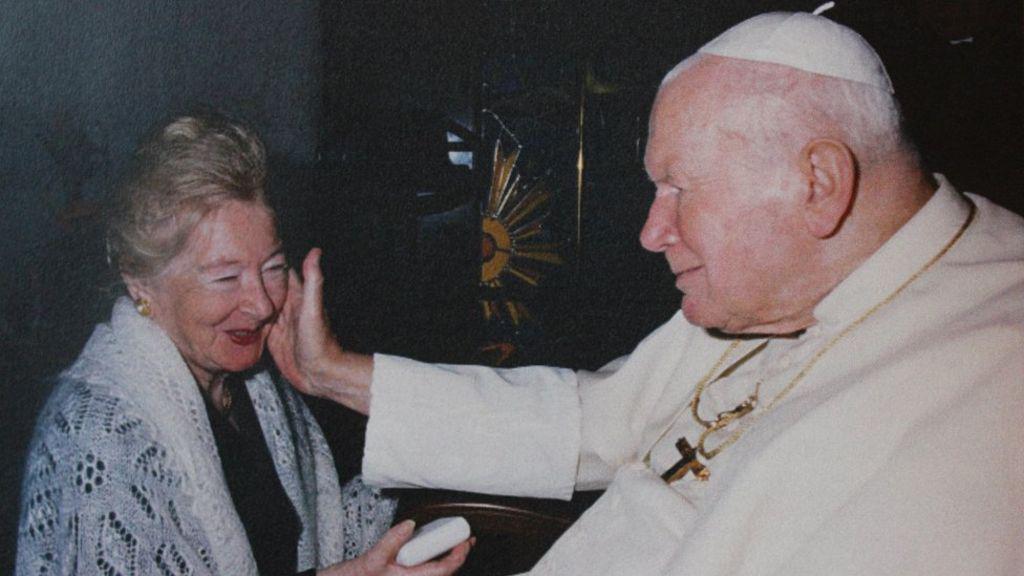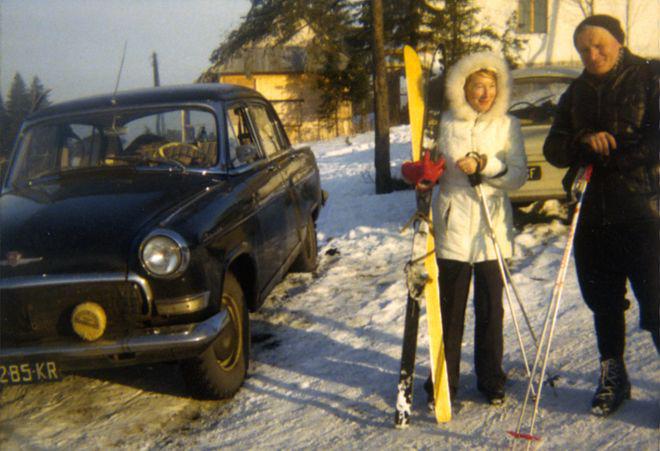|
John Paul II ‘secret letters’ reveal connection to married woman he called ‘a gift from God’
By Justin Wm. Moyer
[with video] Saint Pope John Paul II was the 20th century’s towering super-pontiff. He survived the Nazi occupation of Poland and an assassination attempt. He helped end communism in Europe and, even when plagued by severe health problems, left his mark on the Catholic Church in a papacy that stretched over much of three decades. Metaphorically and physically, he climbed mountains. This week, however, an unexpected glimpse of the man beneath the white hat came from the BBC. In a new report, the network has shined a light on “secret letters” from John Paul II to a married woman that show an intense, if not necessarily inappropriate, friendship. The lasting connection between the man once known only as Cardinal Karol Wojtyla and Anna-Teresa Tymieniecka, a Polish philosopher with three children, began in the 1970s. John Paul II died in 2005; Tymieniecka sold letters from him to her — letters not made public until now — to the National Library of Poland in 2008, and died in 2014. And, whatever the nature of their acquaintance, John Paul II was extremely devoted to a woman he called “a gift from God.” In 1976, he wrote to Tymieniecka: “God gave you to me and made you my vocation.” And: “You write about being torn apart … I could find no answer to these words.” And: “If I didn’t have this conviction, some moral certainty of grace, and of acting in obedience to it, I would not dare act like this.” Photos discovered after Tymieniecka’s death also show another side of a man more familiar to millions as St. Peter’s luminous successor — a man in flowing white robes cruising through crowds of the faithful in his Popemobile. In very different casual snapshots,Wojtyla is leaning on ski poles, or standing outside a tent next to Tymieniecka in shorts or, perhaps, boxer shorts. It should be noted: The BBC did not find evidence of a sexual liaison, and John Paul’s confidantes and biographers said there was not one. “Those who lived at the side of John Paul II know well that there is no place in his life to search for evil,” Cardinal Stanislaw Dziwisz, John Paul’s personal secretary for nearly 40 years said in a statement to the New York Times. “He was a free and transparent man. He did not have any complexes, because he was pure and respected every man in every possible situation.” In a 1996 biography of the pontiff, former Washington Post reporter Carl Bernstein and Marco Politi wrote that those looking for salacious details about John Paul II’s private life were on a fool’s errand. Reporters have “scoured the earth looking for women who had been Karol Wojtyla’s lover, wife, or companion,” they wrote. “They found none because there were none.” Bernstein repeated that claim in the BBC report. “We are talking about Saint John Paul,” he said. “This is an extraordinary relationship … It’s not illicit, nonetheless it’s fascinating. It changes our perception of him.” Bernstein and Politi also interviewed Tymieniecka for their biography. “I never fell in love with the cardinal,” she told them. “How could I fall in love with a middle-aged clergyman?” The BBC, however, believed Tymieniecka, who visited John Paul II the day before he died, had made her feelings known. “I have only seen one side of the correspondence — his letters to her — and it is, of course, sometimes impossible to know what the cardinal is referring to,” the BBC’s Ed Stourton wrote. “But I have done some old-fashioned journalistic sleuthing, and I believe that at an early stage of the relationship — probably in the summer of 1975 — Anna-Teresa Tymieniecka told Karol Wojtyla that she was in love with him.” Whatever its nature, the letters showed John Paul II gave Tymieniecka an important token of friendship. “Already last year I was looking for an answer to these words, ‘I belong to you’, and finally, before leaving Poland, I found a way — a scapular,” he wrote in 1976, two years before he became pope. The devotional necklace, he said, allowed him to “accept and feel you everywhere in all kinds of situations, whether you are close – or far away.” According to the BBC report, after he was elected pope, John Paul wrote to Tymieniecka “to say that he wanted their connection to continue. He said he did not want ‘the exchange of ideas, which I have always thought to be so creative and fruitful’ to be interrupted.” The two “fell out badly” over a book they had been working on, according to the report, and when the Vatican challenged the book she reportedly “felt betrayed” because he failed to defend her. “But eventually the old warmth returned to the relationship,” Stourton wrote. “Women fall in love with priests all the time, and it’s always a big headache,” Father Adam Boniecki, editor-in-chief of the progressive Tygodnik Powszechny Catholic weekly, told AFP. “If she was in love with (Karol) Wojtyla, she was most likely not alone,” Boniecki, a biographer of John Paul II, told AFP. Tymieniecka “translated Karol Wojtyla’s books into English, making his work known to US academics… but her translations caused tension between the two”, Boniecki said. Though the BBC’s revelations were suggestive more than startling, they come amid an international debate about sex and the priesthood. In a far-ranging, freewheeling in-flight press conference in 2014, Pope Francis implied that priestly celibacy might not be that big a deal. “The Catholic Church has married priests in the Eastern rites,” he said. “Celibacy is not a dogma of faith; it is a rule of life that I appreciate a great deal, and I believe it is a gift for the Church. The door is always open, given that it is not a dogma of faith.” Some Catholic priests are even coming out of the closet to, perhaps, even greater controversy. “Priests want to be good priests, they want to do their job,” the Rev. Warren Hall, a priest who lost his job after coming out, told The Post’s Michelle Boorstein last month. “More priests are rightfully more concerned about homelessness versus getting caught up in something about sex. We should be more concerned about those issues [like homelessness] that are impacting people.” [‘I’m gay and I’m a priest, period.’] The revelations — if they are properly classified as “revelations” — about John Paul II also raised questions about whether he was canonized too quickly, particularly given his slow response to sex-abuse scandals in the Catholic Church. “For Pope Francis and Catholic officials to honor John Paul II with this exalted title is extraordinarily heartless and unwise,” read a pamphlet distributed by Survivors Network of those Abused by Priests in 2014, when John Paul was canonized. “It rubs salt into the already deep wounds of tens of thousands of still-suffering clergy sex abuse victims and their loved ones across the globe.” The BBC wondered whether the Vatican had seen all the evidence when considering canonization. “Normally the Vatican asks to see all public and private writings when considering a candidate for sainthood, but the BBC has not been able to confirm whether the letters were seen,” Stourton wrote. While news that a sitting pope in modern times had had an affair would overshadow any other such story, other priests of note have been known to stray — or appear to stray — from the path of celibacy. After Pope Francis praised the life of Trappist monk Thomas Merton last year, some wondered whether Francis should find another role model because Merton had what he deemed an “affair” with a woman he referred to in journals only as “M.” “I have no intention of keeping the M. business entirely out of sight,” Merton wrote in 1967. “I have always wanted to be completely open, both about my mistakes and about my effort to make sense out of my life. The affair with M. is an important part of it and shows my limitations as well as a side of me that is — well, it needs to be known too, for it is part of me.”
|
.
Any original material on these pages is copyright © BishopAccountability.org 2004. Reproduce freely with attribution.


